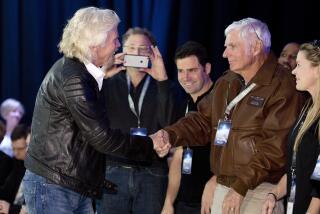His Life Flashes Above Him: Aviation’s First Century
- Share via
--Thomas Sopwith has always been an up, up and away sort of guy. And today, the retired aviation pioneer will have a special reason to look up. It’s his 100th birthday and the Royal Air Force and aviation museums plan a flyby over his home in England. Sopwith, who recalls the Wright brothers’ flight at Kitty Hawk, N.C., in 1903, built the Sopwith Camel, the World War I fighter plane flown in the mission that spelled the end of “Red Baron” Manfred von Richtofen. (Snoopy, the low-flying beagle in Charles M. Schulz’s comic strip Peanuts, pursued the “Red Baron” in a doghouse he imagined to be a Sopwith Camel.) He also produced the Hawker Hurricane of World War II and the Harrier jump-jet, a vertical-takeoff-and-landing craft. The RAF will include some of Sopwith’s creations in the aerial salute over Compton Manor, his estate in Hampshire, southwest of London. Although his eyesight has failed him, Sopwith is “in very great form,” his son, Thomas, said. “He takes a stroll twice a day and keeps a sharp interest in what’s going on by listening to the radio.”
--Norbu Tenzing may never reach his father’s high achievement. Few people will. Tenzing’s father, Tenzing Norgay, scaled Mt. Everest as a porter with Sir Edmond P. Hillary on May 29, 1953. Tenzing, 25, will soon leave his Connecticut home for Tibet to prepare for expedition Everest ‘88, to mark the 35th anniversary of the Hillary-Norgay climb. Tenzing will not attempt to scale the 29,028-foot mountain. Instead, he will be a member of a support team that will man a base camp on the Tibetan side, at about 18,000 feet. (The peak is at the Tibet-Nepal border.) Tenzing said that his father, who died in 1986, would not have wanted him to attempt the summit because of his youth and lack of climbing expertise.
--It was a day for special remembrance. Seven Nobel laureates gathered Sunday at Auschwitz, in Oswiecim, Poland, to mark the anniversary of the camp’s liberation by Soviet troops in January, 1945. Solidarity leader Lech Walesa and Jewish writer Elie Wiesel walked in silence around the site of the Nazi concentration camp, now known as Oswiecim-Brzezinka, where millions of internees died between 1940 and 1945. Wiesel, who coined the term holocaust to describe the massacre, was born in Romania and was imprisoned at both Auschwitz and Buchenwald. Other Nobel winners attending were Herbert Brown of the United States; Betty Williams and Mairead Corrigan of Northern Ireland; Daniel Bovet of Italy and Adolfo Perez Esquivel of Argentina.
More to Read
Sign up for The Wild
We’ll help you find the best places to hike, bike and run, as well as the perfect silent spots for meditation and yoga.
You may occasionally receive promotional content from the Los Angeles Times.





